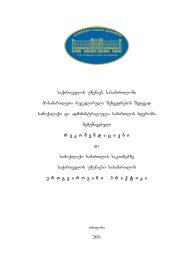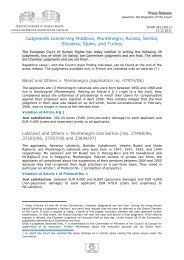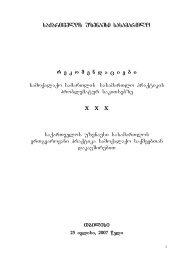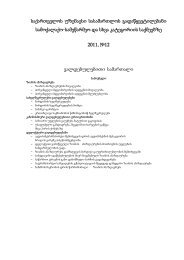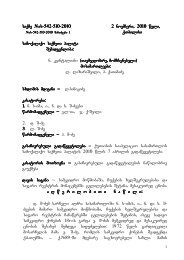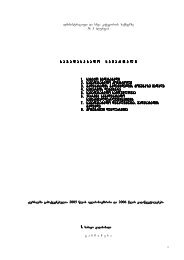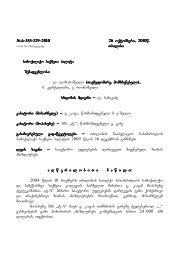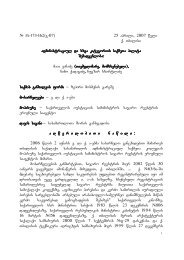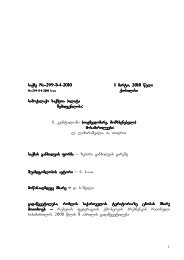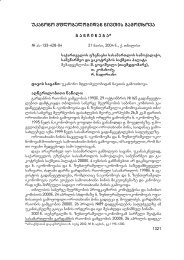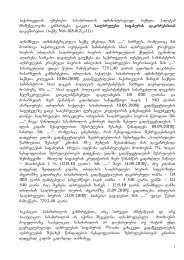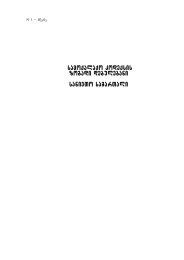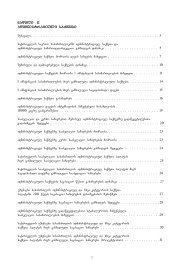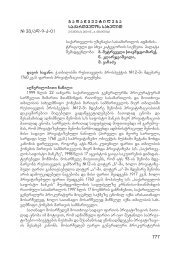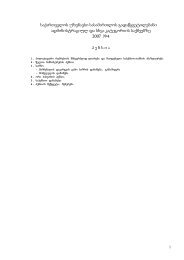marTlmsajuleba kanoni
marTlmsajuleba kanoni
marTlmsajuleba kanoni
You also want an ePaper? Increase the reach of your titles
YUMPU automatically turns print PDFs into web optimized ePapers that Google loves.
in Item B of Article 201 of the Civil Procedure Code, and given by the court. The defendant, if there is a valid<br />
reason, is also authorized to request a reasonable term in order to submit the objection and evidences.<br />
In case of the failure to file an objection, a default judgment is issued based on the principle of procedural<br />
economy, which means that the case shall be adjudicated in a timely manner without a delay. In such a case if the<br />
default judgment is not appealed, it comes into legal force quickly and is executed in the shortest period.<br />
Under Article 232 1 of the Civil Procedure Code, notwithstanding the failure to file an objection, if the facts<br />
indicated in the action do not legally justify the claim, the court appoints a main session. At this stage the evidences<br />
are not accepted from the defendant and the court only hears the legal opinions of the defendant.<br />
The evidences from the defendant are not accepted at the main session in order to prevent the delay in adjudicating<br />
the case. Further, under Paragraph 1 of Article 102 of the Civil Procedure Code, each party shall prove the facts<br />
on which his/her claims and objections are based. As long as the evidences enclosed with the claim, notwithstanding<br />
the failure to file an objection and contradictory evidences, does not legally justify the claim, the court issues not<br />
a default judgment against the defendant but a regular judgment on refusal to satisfy the claim. An appeal may be<br />
filed against this judgment.<br />
The evidences from the defendant are not also accepted at the main session because the claim is not legally<br />
justified anyway, i.e. is groundless and it will not be satisfied.<br />
It is possible that one of the several claims be combined in one action out of which only one justifies legally the<br />
claim and the others do not. This is directly related to Article 232 1 of Civil Procedure Code according to which in<br />
case of the failure to file a response (objection) without an invalid reason, the judge issues a default judgment on<br />
satisfying the claim provided that the facts indicated therein legally justify the claim; otherwise the court appoints<br />
a main session.<br />
In this case the plaintiff may file an appeal against the refusal to satisfy the claim, or if only one of the parties file<br />
an appeal, the other party may file a counter appeal within the ten days after the receipt of the appeal of the other<br />
party.<br />
Perhaps, the legislator considered the appointment of the oral hearing necessary, provided that the action does not<br />
legally justify the claim, since the case is adjudicated on the merits. Though, I do not consider it to be a legitimate<br />
argument because in case of the failure to file an objection without a valid reason, the default judgment issued<br />
without an oral hearing, shall be also considered to be adjudication on the merits. If the default judgment is not<br />
appealed or if the claim is not satisfied, after the default judgment comes into legal effect, the adjudication of a<br />
matter is considered to be final and it will be executed like a regular judgment according to the procedures established<br />
by the law. After the default judgment comes into effect according to Article 266 of Civil Procedure Code, the<br />
parties and their legal successors may not submit the same claims on the same grounds to the court or contest the<br />
facts and legal relationship which were established in the other civil matter by a court judgment.<br />
121



